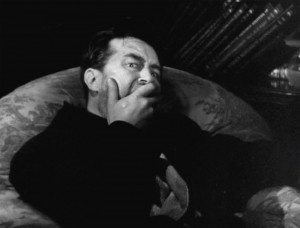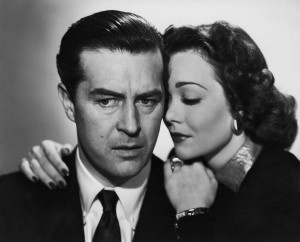“The Lost Weekend,” from a screenplay by Wilder and Charles Brackett, based on a novel by Charles R. Jackson, depicts the inner degradation and torment of Don Birnbaum (Ray Milland in an Oscar-winning performance) who, unable to realize his writing ambitions, turns to the bottle.
Despite a stark portrayal of alcoholism in all its misery and horror, the changes made in the adapting Jackson’s novel to the screen are instructive, because they shed light on Hollywood’s morality standards at the time and on the conventions of portraying screen heroes. In the book, Birnbuam’s frustration derives from an indecisive sexuality; he is a troubled bisexual. However, in the film version, Don suffers from a writer’s creative block. The picture also changed the book’s ending by providing a solution to his drinking problem, using the ploy of a patient, loving girl (played by Jane Wyman) who helps to regenerate him.
 Even so, by standards of the time, there are powerful moments, such as when Ray Milland tells Jane Wyman (his girlfriend): “What I’m trying to say is, I’m not a drinker–I’m a drunk.”
Even so, by standards of the time, there are powerful moments, such as when Ray Milland tells Jane Wyman (his girlfriend): “What I’m trying to say is, I’m not a drinker–I’m a drunk.”
And the last speech, by Milland, referring to his old habit of keeping bottles in various hiding places, is also strong: “My mind was hanging outside the window. It was suspended just about eighteen inches below. And out there in that great big concrete jungle, I wonder how many others there are like me. Those poor bedeviled guys on fire with thirst. Such comical figures to the rest of the world as they stagger blindly towards another binge, another bender, another spree.”
Paramount, the studio that made the movie, realized that the film was dealing with a taboo issue for the big screen and so decided to make the most out of it. The studio ad campaign stated: How daring can the screen dare to be? No adult man or woman can risk missing the startling frankness of ‘The Lost Weekend.’”
 “The Lost Weekend” had earlier won the Best Picture from the New York Film Critics Circle, then under the leadership of the N.Y. Times’ middlebrow critic, Bosley Crowther. Crowther noted that the film “most commendable distinction,” is being “a straight objective report, unvarnished with editorial comment or temperance morality.”
“The Lost Weekend” had earlier won the Best Picture from the New York Film Critics Circle, then under the leadership of the N.Y. Times’ middlebrow critic, Bosley Crowther. Crowther noted that the film “most commendable distinction,” is being “a straight objective report, unvarnished with editorial comment or temperance morality.”
Unlike Wilder’s better films (Double Indemnity, Sunset Boulevard), The Lost Weekend has not withstood well the test of time, thematically, as a realistic portrait of alcoholism. However, what’s still memorable are the expressionist visual style (hallucinatory images of a bat and bleeding mouse), utilizing some of the vocabulary of film noir, and the haunting score of Miklos Rozsa, including the use of theremin instrument (also present in Hitchcock’s films of that era).
Detailed Plot
To illustrate the daily ordeal of an alcoholic, the story unfolds as a journal, spanning five days, from Thursday to Tuesday.
Thursday:
New York writer Don Birnam is packing for a weekend vacation with his brother Wick, who is trying to discourage his drinking. When Don’s girlfriend Helen comes to see them off, she mentions in passing that she has two tickets for a concert. Don heads for Nat’s Bar, missing his train, and then sneaks back into the flat to drink some cheap whisky he has bought, avoiding the worried Helen.
Friday:
 Back at the bar, the owner (Nat) criticizes Don for mistreating Helen, and Don recalls their first meeting in a flashback.
Back at the bar, the owner (Nat) criticizes Don for mistreating Helen, and Don recalls their first meeting in a flashback.
There was a mix-up of cloakroom tickets at the opera, where he had to wait for the person who was given his check in error. This was Helen, with whom he strikes up a romance.
Due to meet her parents for lunch at a hotel bar, he overhears their criticism of him as not worthy of their daughter’s company. Leaving the place, he send a message to her. He confesses of his dual identity, ‘Don the writer,’ who can only write while drunk, and ‘Don the drunk,’ who is bailed-out by his brother. Helen tries to help him.
Back in the present, Don is in another bar. Caught stealing money to pay his bill, he is thrown out. He then finds a bottle he had stashed the previous night and gets drunk.
Saturday:
 Don, broke, is upset as all the pawnshops are closed for the holiday. (Wilder, a Jew, makes reference to Yom Kippur, Day of Atonement, the holiest holiday in the Jewish calendar, in which practitioners fast and atone for their sins).
Don, broke, is upset as all the pawnshops are closed for the holiday. (Wilder, a Jew, makes reference to Yom Kippur, Day of Atonement, the holiest holiday in the Jewish calendar, in which practitioners fast and atone for their sins).
At Nat’s Bar, he is refused service. In desperation, he visits a girl who had given up on him, but now feels sorry for him. Leaving her flat, he falls down the stairs and is knocked unconscious.
Sunday:
Don wakes up in an alcoholics’ ward, where a staff member mocks him and other guests at ‘Hangover Plaza,” but offers to help. Don refuses help, and escapes from the ward.
Monday:
Still broke, Don steals a bottle of whisky and drinks it. Helen returns, alerted by Don’s landlady. Finding him in a delirious state, she vows to look after him.
Tuesday:
 Don slips out and pawns Helen’s coat, the very item that had brought them together, to buy a gun.
Don slips out and pawns Helen’s coat, the very item that had brought them together, to buy a gun.
Helen realizes Don is about to commit suicide when she spots his gun. Determined t prevent him, she does all she can–including offering him a drink–to prevent him from taking his life. As they struggle for the hidden weapon, she reminds Don of her love for him and her sincere concern, trying to convince him that ‘Don the writer’ and ‘Don the drunk’ are the same (essentially good and clean) man.
Don finally commits to writing his novel The Bottle, an account of the weekend events, which will be dedicated to her. He begins to imagine the act of publication and people lining up at bookstores to buy his work.
In the last scene, to prove his new determination, Don drops a cigarette into a glass of whiskey, much to Helen’s surprise and joy.
Visual Symmetry:
The film begins with a long shot of New York’s skyline, with its skyscrapers. Then the camera begins getting closer to one window. Getting inside, we see Don standing by the kitchen.
The Lost Weekend concludes with the camera pulling out of Don’s apartment, again revealing the skyline of New York.
I can only speculate whether Hitchcock had seen Wilder’s film and was influenced by its opening shot, as his 1960 masterpiece, Psycho, begins with a very similar shot of the skyline of Phoenix, Arizona, before the camera gets closer to one window, and getting inside revealing two lovers in a motel, just after having sex.
Oscar Nominations: 7
Picture, produced by Charles Brackett
Director: Billy Wilder
Actor: Ray Milland
Screenplay: Charles Brackett and Billy Wilder
Cinematography (b/w): John F. Seitz
Editing: Doane Harrison
Scoring (Dramatic or Comedy): Miklos Rozsa
Oscar Awards: 4
Picture
Director
Actor
Screenplay
Oscar Context
“The Lost Weekend” won over Hitchcock’s suspense-thriller “Spellbound” and Leo McCarey’s comedy “The Bells of St. Mary’s,” both starring Ingrid Bergman. The ot
her two nominees were the MGM musical “Anchors Aweigh” and Warner’s noir melodrama “Mildred Pierce,” for which Joan Crawford won the Best Actress for a comeback performance.
The most nominated film was “The Bells of St. Mary’s” (8), though it won only one award, for Stephen Dunn’s Sound Recording, perhaps because it was a sequel to “Going My Way,” which swept most of the 1944 Oscars.
Ray Milland was one of the few actors to win the Oscar at his first nomination and not to be nominated again, despite giving many reliable performances.
Ace composer Miklos Rozsa, whose specialty was film noir, was nominated in 1945 for three Oscars. The other two were: “A Song to Remember,” on which he collaborated with Morris Stoloff, and Hitchcock’s “Spellbound,” for which he won.
Cast
Ray Milland as Don Birnam
Jane Wyman as Helen St. James
Phillip Terry as Wick Birnam
Howard Da Silva as Nat
Doris Dowling as Gloria
Frank Faylen as ‘Bim’ Nolan, the nurse in the alcoholic ward
Mary Young as Mrs. Deveridg
Anita Bolster as Mrs. Foley
Lilian Fontaine as Mrs. St. James
Frank Orth as cloak room attendant
Lewis Russell as Mr. St. James




Speak Your Mind